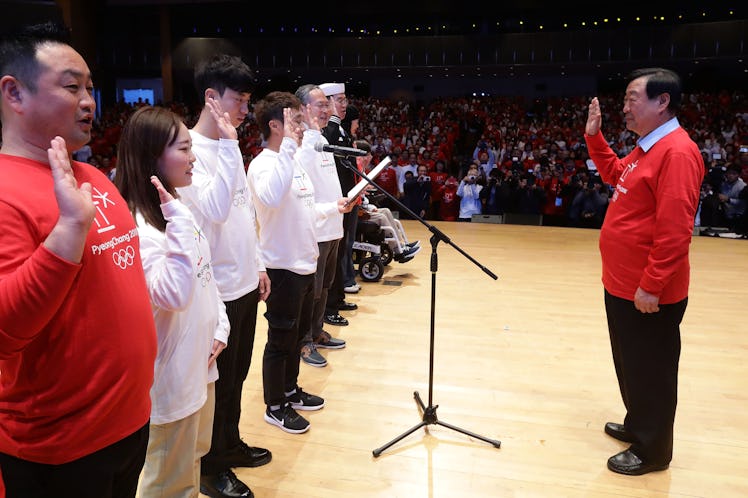
Here's Why The Olympic Oath Is So Important To Competing Teams
The 2018 PyeongChang Winter Olympics are officially in swing after the opening ceremony took place on Friday, Feb. 9. The Olympic Oath is a huge deal during the opening ceremony, an honor ranking up there among lighting the torch and bearing the flag. And this year, there's even more riding on it.
The games, held in South Korea, actually had its first few sporting events earlier this week, but the highly anticipated opening ceremony began at 6 a.m. ET Friday, officially kicking off the 17-day Olympics. The oath is a critical component of the ceremony.
Per NBC, one athlete from the host country typically delivers the oath. Yonhap News reports that this year's chosen oath-taker is Mo Tae-bum, a South Korean speed skater. But this year, Mo is reciting it for more than just his fellow athletes.
According to the official Olympic site, the oath is historically made by three categories of attendees: the athletes, the officials, and the coaches, in that order. But in September 2017, the International Olympic Committee (IOC) changed the rules to combine all three of those oaths into one, shortening this portion of the ceremony. This is the first Olympics at which one athlete will be making the oath on behalf of all three groups.
Now, the new oath procedures begin with each representative reciting their part: "In the name of the athletes," "In the name of all judges," and "In the name of all the coaches and officials," respectively. From there, the athlete then recites the rest of the oath on behalf of the other two groups. That part goes:
We promise to take part in these Olympic Games, respecting and abiding by the rules and in the spirit of fair play. We all commit ourselves to sport without doping and cheating. We do this, for the glory of sport, for the honor of our teams and in respect for the Fundamental Principles of Olympism.
This year's oath represents the officials, coaches, and judges in addition to some 3,000 athletes. Fittingly, the oath-taking athlete is typically an accomplished one. Per Yonhap, Mo won a gold medal for speed skating in the 2010 Vancouver Games.
It takes years to win a bid to host the Olympic Games, plus years to prepare for it. PyeongChang was officially named the 2018 location in 2011 after an eight-year voting process — so there's a lot riding on the opening ceremony and the oath to go well and do the country proud.
There's also the weight of history, embedded in the oath, to consider. Per NBC, the oath was originally written by Pierre de Coubertin, a French historian who founded the IOC and is credited with bringing the modern Olympics to life in the late 1800s. But although the first Olympic Games were in 1896, it wasn't until 1920 that the first athlete, Belgian fencer Victor Boin, took the oath.
While the oath and the proceedings around it have been modified over the years, the text hasn't strayed much from its original version written more than 100 years ago. So the voice of the father of the modern Olympics is omnipresent even in today's version.
And in the current context, there's also tremendous pressure on PyeongChang as this Games' host. North and South Korea, with a politically fraught history, have temporarily put aside their differences this month to march under a unified flag. Not to mention the tense position South Korea has been in on the diplomatic front in negotiations between North Korea and the U.S. involving the North's nuclear program. Getting the North to participate in the Olympics at all was a massive feat of diplomacy. No pressure, right?
Finally, the language of the oath is a not-to-subtle message about what the Olympic values — and rules — stipulate. The "without doping and cheating" clause has been present in some form or another since at least 2012. This year, the clause takes on particular meaning given that Russia is banned from competing after the doping scandal from the 2014 Sochi Games. (Individual athletes can still compete but not representing the country.)
Mo has arguably got a lot on his shoulders in delivering the oath at this Olympics.
To learn more, visit teamusa.org. The Winter Olympics will air live, starting February 8.